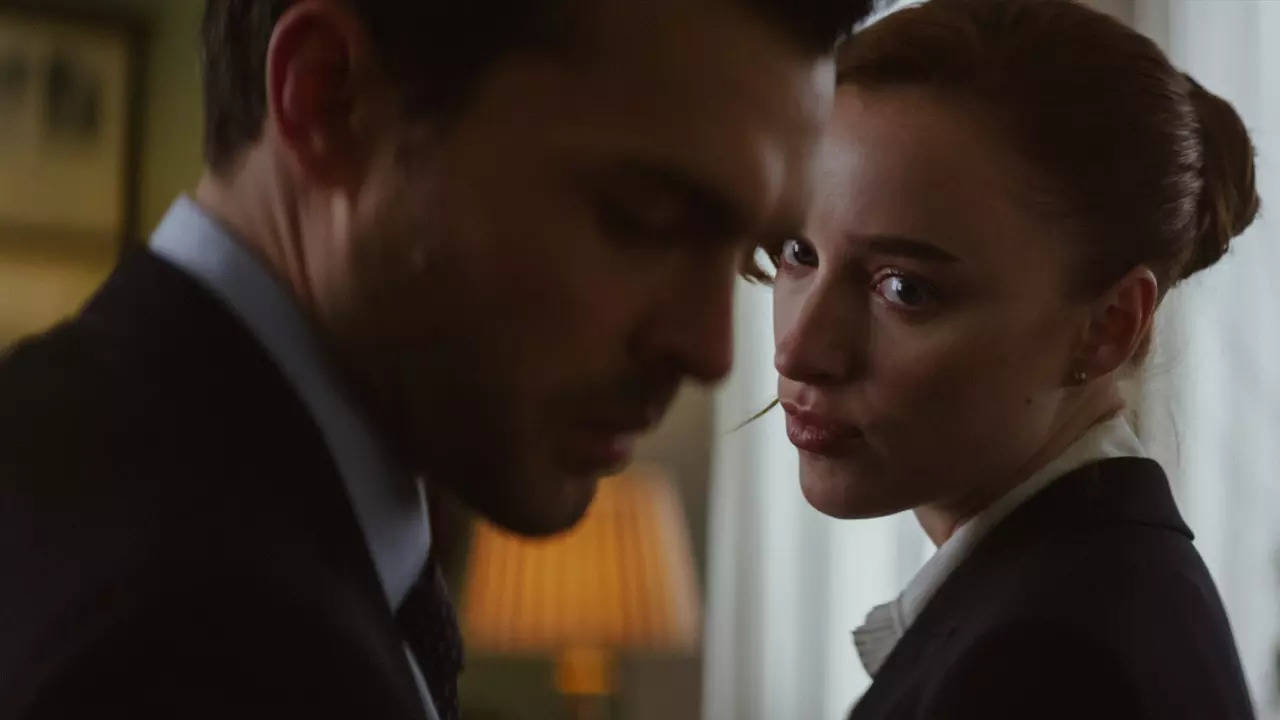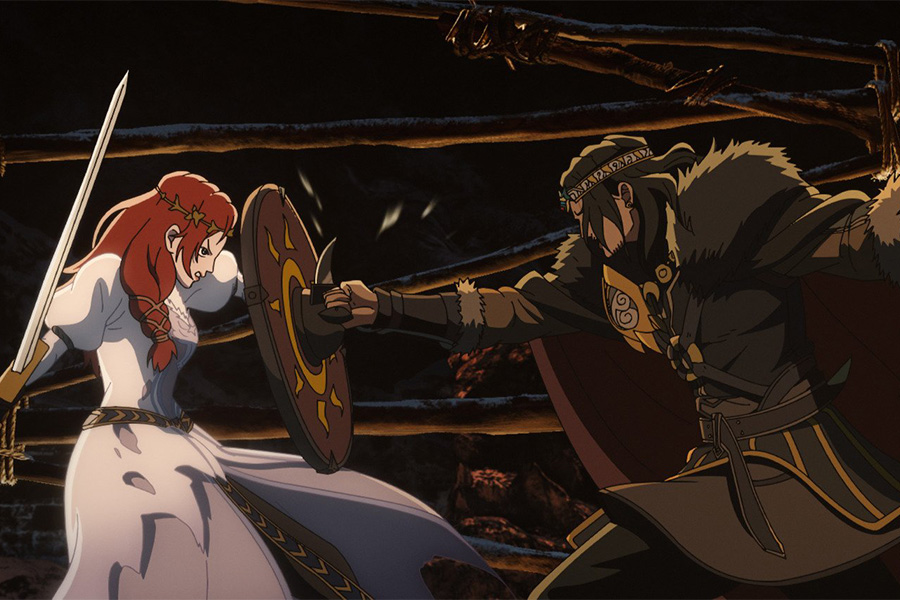Movie Reviews
Fair Play Movie Review: The ‘Foul Play’ Of Office Romance

About Fair Play
The difference between the opening and ending sequences of Netflix’s Fair Play is so jarring. The racy thriller by Chloe Domont opens with the joy of an engagement, while Fair Play’s ending just leaves you unsettled at the resolution. The tense drama is led by the fantastic Phoebe Dynevor and Alden Ehrenreich who grab viewers into their worlds and make you feel for their characters.
Fair Play: Narrative
Emily (Phoebe Dynevor) and Luke (Alden Ehrenreich) work together in a high-profile Wall Street finance firm. Secretly, they have been in a relationship for two years, which is prohibited at work. But the couple are madly in love with one another, or so we assume.
All it takes is a promotion to come between them. The shift happens quite suddenly as Emily is now in a position of power at work, upsetting the balance between them. Luke is shown to be more suspicious, and Emily grows more anxious and guilty. This uneasy dynamic builds up and up until it explodes.
Fair Play: Direction
Chloe Domont’s feature directorial debut grabs you in immediately. The filmmaker also shapes Fair Play, almost like a horror film in the second half, as tensions run high between Emily and Luke. Chloe uses an edgy score that lifts the atmosphere between them. The conversations between the couple are increasingly strained and they grow to an eventual boiling point.
Fair Play: Acting
Bridgerton’s Phoebe Dynevor is magnificent as the unapologetic Emily. That last scene alone should get her nominated for some awards next year. Meanwhile, Alden Ehrenreich has the more unlikeable part, and he lets Luke’s wounds fester over time, always believing himself to be the aggrieved party. After a while, Fair Play is more about the games Emily and Luke play with one another, trying to elicit a reaction. The self-destruction between them becomes hard to watch, but like a car accident, you look on.
The power struggle is also reflected in their sex life as Luke withdraws affection from Emily. Both actors convey these very difficult emotions in a nuanced manner. Eddie Marsan is also commanding as the firm’s top boss who shows favourites early on.
Fair Play: Critique
Fair Play, which premiered at the Sundance Film Festival in January, plays out the glorious dissolution of a relationship. The manner in which it falls apart is quite disconcerting. The scenes in the office that illustrate Emily’s loneliness as the only woman in the all-boys club also leave a mark. The difference when Emily is with them to when Luke is amongst them is telling as well.
Chloe Domont’s handling of the misogyny Emily has to face both at work and with Luke is so striking. And Phoebe Dynevor displays so many conflicting emotions on her face as she processes each situation.
Fair Play has an ending that will leave people talking and it’s a scene that can be used for analysis over and over in gender studies. It’s not just the perceptions men and women have in relationship; it’s also about respect and assertion of where they see each other in today’s modern world. Fair Play is a must watch, don’t miss it!
End of Article

Movie Reviews
Leela Vinodham Review: A Plain Rural Romance

BOTTOM LINE
A Plain Rural Romance
PLATFORM
ETV WIN
What Is the Film About?
Prasad, a happy-go-lucky youngster, has just turned a graduate, spending three college years without gathering the courage to express his love for Leela. After many brief glances, failed attempts to strike up a conversation with Leela, Prasad finally connects with her after over mobile texts. When one of his texts doesn’t earn an immediate response, Prasad gets increasingly anxious.
Performances
This is one among Shanmukh Jaswanth’s better digital outings in the recent times, where he impressively slips into the role of an anxious village boy. Anagha Ajith has limited screen time but delivers the goods in key situations without trying too hard. RJ Mirchi Saran (Raji) is the pick of the lot among Prasad’s friends, though his timing appears to be slightly influenced by Sunil.
Other actors in the gang – Madhan Majji, Chaitanya Garikina, Shiva Thummala, Shravanthi Anand and others – have decent screen presence as well. Surprisingly, the experienced hands like Aamani, Goparaju Ramana, VS Roopa Lakshmi, don’t add much value to the proceedings.
Also Read – OTT Review: Parachute on Hotstar: A Simple and Warm Watch
Analysis
Also Read – Sikandar Ka Muqaddar Review: A Mega Bore Crime Thriller
Like scores of stories in Telugu cinema and on OTT thriving on nostalgia, Leela Vinodam is a tender, small-town romance told from a male perspective. Set in the late 2000s, during the early days of the mobile phone era where communication took a new digital turn, the film banks on a simple idea, tapping into the insecurities and apprehensions of a good-at-heart, lovestruck youngster Prasad.
Borrowing a leaf out of films like Mail, Raja Vaaru Rani Gaaru, Leela Vinodam’s protagonist Prasad is a timid boy who struggles to convey his love to a college sweetheart Leela. He is surrounded by friends – Raji, Swarna and gang – who push him to do the needful but end up confusing him more. The wafer-thin story has a minimal conflict, focusing on the little joys in villages and one-sided love.
Also Read – OTT Review: Despatch – Bajpayee Too Can’t Save This Bore
The director Pavan Sunkara takes his own sweet-time to establish Prasad’s love for Leela in the first 30 minutes through his interactions with a best friend. While it’s evident that Leela is interested in Prasad, the absence of a direct confirmation makes the latter anxious. When he ultimately shares his feelings for Leela over a text and she doesn’t reply, all hell breaks loose.
Leela Vinodam, more than a love story, serves as a time-capsule of a different era (probably aimed at the 90s kid?) before social media, other modes of instant communication took charge of our lives and SMS was the go-to option for conversations. Through Prasad’s confusions, the film captures a brief passage of time in the character’s lives where they could afford to be irresponsible.
That the film relies on a very basic premise – a boy’s wait for a response from his lover – is its strength and weakness at once. The simplistic idea is an advantage because the conflict is very relatable to its target audience. There’s no scope for confusion in the storytelling and the tale provides an indirect opportunity to explore the rural milieu through the oddball characters, sprinkled with humour.
However, after a point, the screenplay loses its spunk and gets laborious, as the director desperately finds various ways to delay the inevitable and understand Prasad’s confusions from many dimensions through imaginary scenarios, trying to decode what factors could’ve prevented Leela from responding to him. Ultimately, the impressive climax salvages the film, ending it on a feel-good note.
Leela Vinodam is neither good nor very bad. It’s simply an inoffensive time pass fare with a few takeaways – nostalgia, humour and bromance. A more imaginative screenplay could’ve bettered its impact.
Music and Other Departments?
TR Krishna Chetan’s score keeps the playful spirit of the story intact, though the songs are strictly okay. Anush Kumar’s cinematography, replete with a lively colour palette, is an asset to the film, making full use of the pleasant rural backdrop and prominent landmarks in the village. Better work with the editing and the screenplay may have helped its cause.
Highlights?
Relatable story
Nostalgia factor
Decent performances, cinematography
Drawbacks?
Tedious screenplay
Writing lacks freshness, novelty
Inconsistent with humour
Did I Enjoy It?
Only in parts
Will You Recommend It?
If you don’t mind an okayish small-town tale on one-sided love
Leela Vinodham OTT Movie Review by M9
Movie Reviews
Movie Review: 'The Lord of the Rings: The War of the Rohirrim' – Catholic Review

NEW YORK (OSV News) – Catholic moviegoers will naturally take an interest in any project related to the works of their renowned co-religionist, novelist J.R.R. Tolkien (1892-1973). But the question always remains whether any new adventure set in his fictional land of Middle-earth will share in the elusive magic of the stories he himself spun.
In the case of the animated drama “The Lord of the Rings: The War of the Rohirrim” (Warner Bros.), unfortunately, the comparison is less than favorable to the newcomer. While director Kenji Kamiyama’s fantasy is often lovely to behold and its moral values are mostly in order, his tale of derring-do stagnates because the characters who inhabit it are mostly one-dimensional.
Take our heroine, Princess Hera (voice of Gaia Wise), for example. A dauntless warrior whose courage and skills are initially underrated by her otherwise sage father, King Helm Hammerhand (voice of Brian Cox), she’s a symbol of female empowerment. Beyond that, however, we learn little about her.
The conflict of the title is initiated after Hera’s childhood friend, Wulf (voice of Luke Pasqualino), seeks her hand in marriage and is rebuffed. Amid the recriminations that follow, King Helm unintentionally takes the life of Wulf’s dad, Freca (voice of Shaun Dooley), instantly transforming the bereft son into his, and Hera’s, implacable enemy.
As Wulf relentlessly pursues his revenge, the script — penned by a quartet of screenwriters — highlights his principal adversaries’ chivalrous dedication to truth-telling, faith-keeping and the granting of mercy. Yet there’s also a vaguely discernible anti-marriage message attached to Hera’s insistence on remaining independent and untethered.
While the narrative of her struggle is clearly meant to seem epic and poetic, there’s a static feel to the proceedings with Hera and her allies never faltering in virtue and Wulf proving villainous at every turn. As a result, a sense of investment in the fate of those on screen is largely lacking.
Assessed for its appropriate audience, the movie is more successful. The strife is bloodless and the dialogue almost unblemished. So, although it’s too frightening for little kids, this addition to Tolkien’s lore — set 200 years before the action of his three main volumes — is acceptable for most others.
The film contains stylized combat and other violence, characters in peril, some grim images and a single mild oath. The OSV News classification is A-II — adults and adolescents. The Motion Picture Association rating is PG-13 — parents strongly cautioned. Some material may be inappropriate for children under 13.
Read More Movie & TV Reviews
Copyright © 2024 OSV News
Movie Reviews
Movie Review: 'Kraven the Hunter' – Catholic Review

NEW YORK (OSV News) – As strained as it is bloodsoaked and morally wayward, the would-be action adventure “Kraven the Hunter” (Columbia) is a hopeless dud. On the upside, moviegoers misguided enough to patronize the film will likely be too bored to be much corrupted by it.
After a brief slice of mayhem set in the present day, director J.C. Chandor’s brutish origin story for the titular Marvel Comics character carries us back to the unhappy youth of his alter ego, Sergei Kravinoff (Levi Miller). Both mild-mannered Sergei and his equally gentle half-brother Dimitri (Billy Barratt) live in fear of their Russian gangster dad, Nikolai (Russell Crowe).
Determined to toughen both lads up, Nikolai forces them to join him on an African safari, during which Sergei has a near-fatal encounter with a lion. Yet a magical potion given to him by a stranger named Calypso (Diaana Babnicova) — a girl his own age to whom viewers have previously been introduced — not only revives Sergei but endows him with superpowers.
Once grown, and now played by Aaron Taylor-Johnson, Sergei uses his gifts to track down criminals to whom he doles out do-it-yourself justice, gaining him his nickname. The intense isolation of his undercover lifestyle is relieved only by his ongoing relationship with Dimitri (Fred Hechinger) and his newly-minted partnership with the adult version of Calypso (Ariana DeBose).
Calypso, a crusading attorney who is meant to serve as our ethical compass, briefly questions Sergei’s extra-legal methods. But this does nothing to stop his sequential rampages. Throw in the fact that Calypso’s family features a long line of tarot card-carrying witches and it’s clear that
cinephiles of any sense will not feel a yen for “Kraven.”
The film contains excessive graphic violence with much gore, benignly viewed vigilantism, an occult theme, a few uses of profanity and several instances each of rough language and crude talk. The OSV News classification is O — morally offensive. The Motion Picture Association rating is R — restricted. Under 17 requires accompanying parent or adult guardian.
Read More Movie & TV Reviews
Copyright © 2024 OSV News
-

 Business1 week ago
Business1 week agoOpenAI's controversial Sora is finally launching today. Will it truly disrupt Hollywood?
-

 Politics6 days ago
Politics6 days agoCanadian premier threatens to cut off energy imports to US if Trump imposes tariff on country
-
/cdn.vox-cdn.com/uploads/chorus_asset/file/25782636/247422_ChatGPT_anniversary_CVirginia.jpg)
/cdn.vox-cdn.com/uploads/chorus_asset/file/25782636/247422_ChatGPT_anniversary_CVirginia.jpg) Technology7 days ago
Technology7 days agoInside the launch — and future — of ChatGPT
-
/cdn.vox-cdn.com/uploads/chorus_asset/file/25789444/1258459915.jpg)
/cdn.vox-cdn.com/uploads/chorus_asset/file/25789444/1258459915.jpg) Technology5 days ago
Technology5 days agoOpenAI cofounder Ilya Sutskever says the way AI is built is about to change
-

 Politics5 days ago
Politics5 days agoU.S. Supreme Court will decide if oil industry may sue to block California's zero-emissions goal
-
/cdn.vox-cdn.com/uploads/chorus_asset/file/25546252/STK169_Mark_Zuckerburg_CVIRGINIA_D.jpg)
/cdn.vox-cdn.com/uploads/chorus_asset/file/25546252/STK169_Mark_Zuckerburg_CVIRGINIA_D.jpg) Technology5 days ago
Technology5 days agoMeta asks the US government to block OpenAI’s switch to a for-profit
-

 Politics7 days ago
Politics7 days agoConservative group debuts major ad buy in key senators' states as 'soft appeal' for Hegseth, Gabbard, Patel
-

 Business3 days ago
Business3 days agoFreddie Freeman's World Series walk-off grand slam baseball sells at auction for $1.56 million




















